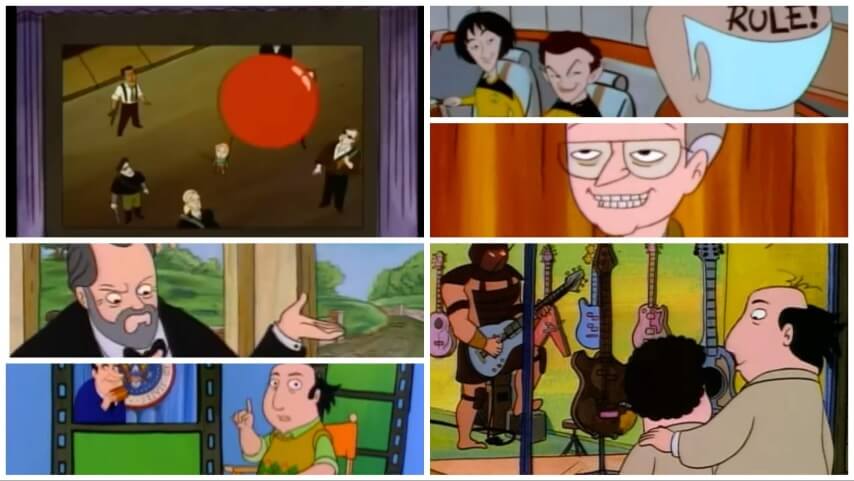30 years ago, The Critic enrolled six-year-olds everywhere in film school
Al Jean and Mike Reiss’ dark comedy about the world’s saddest profession was a big hit on the playground

Three decades ago—on January 26, 1994, to be precise—two glorious words graced the ears of 26 million ABC viewers for the first time: “It stinks.” Cartoon film critic Jay Sherman (voiced by Jon Lovitz) had a massive audience but would be gone a year and a half later. The brainchild of early Springfield residents James L. Brooks, Al Jean, and Mike Reiss, The Critic may have had a short life, but its legacy lives on. Personally, I can’t untangle myself from Jay Sherman. But as lovely as it has been to be compared to a guy who takes literal orders from his stomach and whose ex-wife regards him with the warmth of a guard at Abu Ghraib, I can’t deny the show’s impact on my life. It was my first exposure to a broader film culture.
The Critic has been with me my entire adult life and most of my childhood; the jokes from its 23-episode original run are never far from lips. I remain one of the few, the proud, still using the word “Duke-a-licious,” a situation that can only be described as a “Duke-tastrophe.” When I sat down to rewatch the show this year, I faced another Duke-tastrophe: I am now the same age as Jay Sherman, work in his field, and share similar opinions about the sequels and reboots that get made over actual movies. It stinks. It all stinks.
I was already obsessed with movies and TV when The Critic came to town. Nursing between six and 11 Coca-Colas a day, I’d bounce on my couch in a caffeine-induced bender and pray aloud to the gods of HBO to play Batman, Beetlejuice, or Pee-Wee’s Big Adventure next. Stuck in my Tim Burton cul-de-sac, I’d suffer through the afternoon until The Simpsons began its nightly rerun marathon. When ads for The Critic, a new show “from the creators of The Simpsons” about a guy who “hates everything he sees,” began airing during Home Improvement, who was I to resist?
My parents didn’t have time to worry about my viewing habits. My mom was diagnosed with M.S. shortly after I was born, and my dad owned a small business when he wasn’t cooking for, picking up after, and driving around my sister and me. There was no time to monitor, but my dad would facilitate my TV addiction. It was the only way to shut me up. When South Park premiered in 1997, he taped it for me because it aired after bedtime. When Bigger, Longer & Uncut came out two years later, he defied the box-office attendant’s warning that the movie wasn’t appropriate for 11-year-olds with a resigned “I know” and escorted me into the theater. Decades later, he told me he figured I’d be fine. How wrong he was.
Rising from the ashes of a Today Show parody and a failed Krusty The Clown spinoff set in New York, The Critic follows the tragic tale of Dr. Jay Sherman, PhD, a Pulitzer Prize-winning adopted son of a billionaire, who rakes in a six-figure salary saying Jurassic Park II “stinks” on his nationally syndicated film review show, Coming Attractions. Despite the appearance of a charmed life, Jay is often the focus of New York’s ire. Every episode opens with him receiving bad news, a bird stealing his toupee, and him cracking the ice at Rockefeller Center. But Jay isn’t as cynical as his catchphrase makes him appear. He’s a vigorous defender of the arts who, in the name of good movies, refuses to cow to the demands of his Ted Turner-inspired boss, Duke Philips (voiced by a brilliant Charles Napier). Jay spent his career criticizing Hollywood hacks, instilling in viewers that, maybe, not every movie was good. The message stuck.
Art always seemed under attack on The Critic, in absurd and relevant ways. His father smashed Guernica for fun, and his boss, a proto-Jack Donaghy, digitally created ad space in One Flew Over The Cuckoo’s Nest. In the world of Critic creators Jean and Reiss, even arthouse fairy tales like The Red Balloon can become The Red Balloon 2: Revenge Of The Red Balloon. The unsubtle parody “Clint Eastwood is Dirty Harry in Robo Canine Cop And A Half 2” made sure I wouldn’t look at my precious RoboCop 2 the same.

 Keep scrolling for more great stories from A.V. Club.
Keep scrolling for more great stories from A.V. Club.